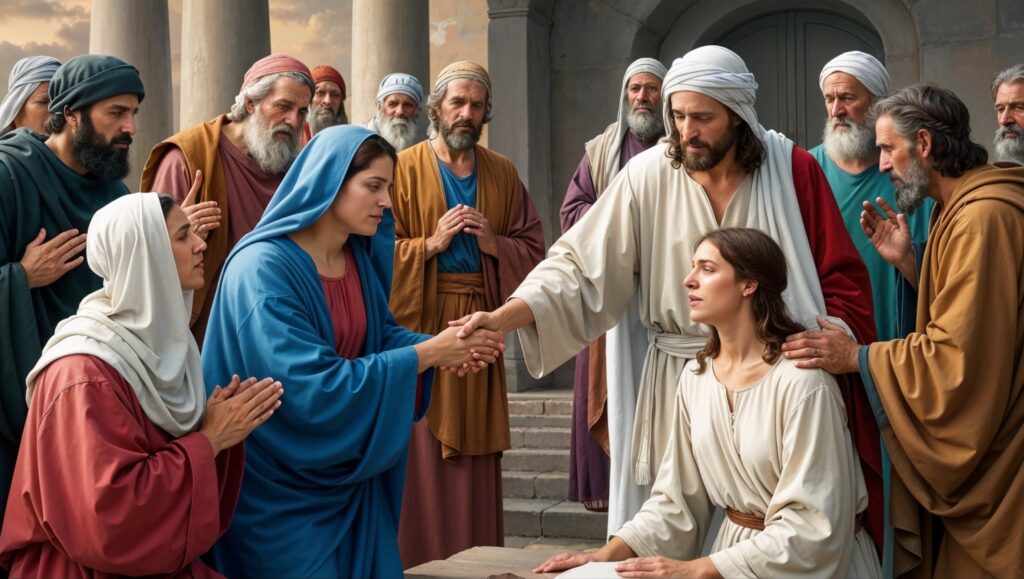In a poignant moment in 2 Kings 13:14, we witness the deep bond between Elisha, the prophet of God, and King Jehoash of Israel. As Elisha lay on his deathbed, Jehoash’s words reveal profound respect and recognition of Elisha’s role as a spiritual leader and protector of Israel. His cry, “My father! My father! The chariots and horsemen of Israel!” speaks not only to Elisha’s influence but also to the power of being a reference—a living example—of God’s love, guidance, and provision.
2 Kings 13:14 The New International Version
14 Now Elisha had been suffering from the illness from which he died. Jehoash king of Israel went down to see him and wept over him. “My father! My father!” he cried. “The chariots and horsemen of Israel!”
What Does It Mean to Be a Reference of the Father’s Love?
To be a reference is to embody and reflect the love, grace, and truth of God in such a way that others can look to you for guidance, encouragement, and hope. Just as Elisha served as a spiritual anchor for Israel, we too are called to be living references of the Father’s love in our families, communities, and workplaces.
Being a reference doesn’t mean being perfect; rather, it means allowing God’s love to flow through us despite our imperfections. It means pointing others to Him through our actions, words, and faithfulness.
Elisha as a Reference of God’s Love
Elisha’s life was marked by unwavering commitment to God’s will. As a prophet, he performed miracles that demonstrated God’s power and compassion—healing the sick, providing for the needy, and even raising the dead. But beyond his miraculous deeds, Elisha’s greatest legacy was his role as a spiritual guide who consistently pointed Israel back to God.
When Jehoash wept over Elisha, calling him “the chariots and horsemen of Israel,” he acknowledged that Elisha had been more than just a prophet; he had been the true source of Israel’s strength. This phrase symbolized military power and divine protection, underscoring that it was not armies or weapons that safeguarded Israel but God working through His servant.
Elisha’s life reminds us that when we live as references of God’s love, we become vessels through which His power and presence are made known.
How Can We Be References of the Father’s Love Today?
In our modern world, being a reference of God’s love may not involve parting rivers or calling down fire from heaven like prophets of old. Yet, in everyday acts of kindness, faithfulness, and compassion, we can reflect His love in ways that profoundly impact those around us.
Here are some practical ways to live as references of the Father’s love:
- Lead with Compassion: Elisha often acted out of deep compassion for others—whether it was helping a widow in need (2 Kings 4:1-7) or healing Naaman from leprosy (2 Kings 5). Similarly, we are called to show empathy and kindness to those who are hurting. A simple act of kindness can serve as a powerful testimony of God’s love.
- Point Others to God: Elisha never sought glory for himself; his miracles always pointed back to God as the source of power. In our own lives, we can point others to God by sharing how His grace has transformed us or by encouraging others to seek Him in prayer and Scripture.
- Be Faithful in Prayer: Just as Elisha interceded for Israel through prayer (2 Kings 6:17), we too can stand in the gap for others by lifting them up in prayer. Praying for friends, family members, or even strangers is one way to reflect God’s care for all people.
- Live with Integrity: Elisha lived with integrity, faithfully serving God even when it was difficult or unpopular. In our own lives, living with honesty and integrity—choosing what is right over what is easy—can set us apart as reflections of Christ.
- Share Your Testimony: Jehoash recognized Elisha as a reference because he had witnessed his faithfulness over time. Likewise, sharing your personal testimony—how God has worked in your life—can inspire others to trust Him more deeply.
Encouragement for Those Who Feel Unworthy
You may feel unqualified or unworthy to be a reference of God’s love. Perhaps you think your past mistakes disqualify you or that your faith isn’t strong enough. But take heart: God doesn’t call the perfect; He perfects those He calls.
Elisha himself was once an ordinary farmer before being called by Elijah (1 Kings 19:19-21). What made him extraordinary was not his background but his willingness to surrender fully to God’s will. In the same way, when you open your heart to God and allow Him to work through you, He can use you as a beacon of His love.
The Legacy We Leave Behind
Like Elisha, each one of us has an opportunity to leave behind a legacy that points others toward God. When people look back on your life, will they see someone who reflected the Father’s love? Will they remember you as someone who encouraged them in their faith journey?
As followers of Christ, our ultimate goal is not personal success or recognition but glorifying God through how we live and love. By being references of His love—through compassion, prayer, integrity, and faithfulness—we can leave an eternal impact on those around us.
Read More About This Devotional
Words of Wisdom: Reference: The Transformative Power of Making God Our True North
Quote of the Day: “Following in the Father’s footsteps and taking action in doing His will result in great testimonies”
Closing Reflection
Today, let us reflect on Elisha’s example and ask ourselves: Am I living as a reference of the Father’s love? If not, what steps can I take to align my life more closely with His will? Remember that even small acts done in love can have ripple effects far beyond what we can see.
As Jesus said in Matthew 5:16: “Let your light shine before others, that they may see your good deeds and glorify your Father in heaven.” May we all strive to be lights in this world—living references that draw others closer to the heart of our loving Father.
Scripture reading for the day
Acts 27 The New International Version
Paul Sails for Rome
27 When it was decided that we would sail for Italy, Paul and some other prisoners were handed over to a centurion named Julius, who belonged to the Imperial Regiment. 2 We boarded a ship from Adramyttium about to sail for ports along the coast of the province of Asia, and we put out to sea. Aristarchus, a Macedonian from Thessalonica, was with us.
3 The next day we landed at Sidon; and Julius, in kindness to Paul, allowed him to go to his friends so they might provide for his needs. 4 From there we put out to sea again and passed to the lee of Cyprus because the winds were against us. 5 When we had sailed across the open sea off the coast of Cilicia and Pamphylia, we landed at Myra in Lycia. 6 There the centurion found an Alexandrian ship sailing for Italy and put us on board. 7 We made slow headway for many days and had difficulty arriving off Cnidus. When the wind did not allow us to hold our course, we sailed to the lee of Crete, opposite Salmone. 8 We moved along the coast with difficulty and came to a place called Fair Havens, near the town of Lasea.
9 Much time had been lost, and sailing had already become dangerous because by now it was after the Day of Atonement. So Paul warned them, 10 “Men, I can see that our voyage is going to be disastrous and bring great loss to ship and cargo, and to our own lives also.” 11 But the centurion, instead of listening to what Paul said, followed the advice of the pilot and of the owner of the ship. 12 Since the harbor was unsuitable to winter in, the majority decided that we should sail on, hoping to reach Phoenix and winter there. This was a harbor in Crete, facing both southwest and northwest.
The Storm
13 When a gentle south wind began to blow, they saw their opportunity; so they weighed anchor and sailed along the shore of Crete. 14 Before very long, a wind of hurricane force, called the Northeaster, swept down from the island. 15 The ship was caught by the storm and could not head into the wind; so we gave way to it and were driven along. 16 As we passed to the lee of a small island called Cauda, we were hardly able to make the lifeboat secure, 17 so the men hoisted it aboard. Then they passed ropes under the ship itself to hold it together. Because they were afraid they would run aground on the sandbars of Syrtis, they lowered the sea anchor and let the ship be driven along. 18 We took such a violent battering from the storm that the next day they began to throw the cargo overboard. 19 On the third day, they threw the ship’s tackle overboard with their own hands. 20 When neither sun nor stars appeared for many days and the storm continued raging, we finally gave up all hope of being saved.
21 After they had gone a long time without food, Paul stood up before them and said: “Men, you should have taken my advice not to sail from Crete; then you would have spared yourselves this damage and loss. 22 But now I urge you to keep up your courage, because not one of you will be lost; only the ship will be destroyed. 23 Last night an angel of the God to whom I belong and whom I serve stood beside me 24 and said, ‘Do not be afraid, Paul. You must stand trial before Caesar; and God has graciously given you the lives of all who sail with you.’ 25 So keep up your courage, men, for I have faith in God that it will happen just as he told me. 26 Nevertheless, we must run aground on some island.”
The Shipwreck
27 On the fourteenth night we were still being driven across the Adriatic Sea, when about midnight the sailors sensed they were approaching land. 28 They took soundings and found that the water was a hundred and twenty feet deep. A short time later they took soundings again and found it was ninety feet deep. 29 Fearing that we would be dashed against the rocks, they dropped four anchors from the stern and prayed for daylight. 30 In an attempt to escape from the ship, the sailors let the lifeboat down into the sea, pretending they were going to lower some anchors from the bow. 31 Then Paul said to the centurion and the soldiers, “Unless these men stay with the ship, you cannot be saved.” 32 So the soldiers cut the ropes that held the lifeboat and let it drift away.
33 Just before dawn Paul urged them all to eat. “For the last fourteen days,” he said, “you have been in constant suspense and have gone without food—you haven’t eaten anything. 34 Now I urge you to take some food. You need it to survive. Not one of you will lose a single hair from his head.” 35 After he said this, he took some bread and gave thanks to God in front of them all. Then he broke it and began to eat. 36 They were all encouraged and ate some food themselves. 37 Altogether there were 276 of us on board. 38 When they had eaten as much as they wanted, they lightened the ship by throwing the grain into the sea.
39 When daylight came, they did not recognize the land, but they saw a bay with a sandy beach, where they decided to run the ship aground if they could. 40 Cutting loose the anchors, they left them in the sea and at the same time untied the ropes that held the rudders. Then they hoisted the foresail to the wind and made for the beach. 41 But the ship struck a sandbar and ran aground. The bow stuck fast and would not move, and the stern was broken to pieces by the pounding of the surf.
42 The soldiers planned to kill the prisoners to prevent any of them from swimming away and escaping. 43 But the centurion wanted to spare Paul’s life and kept them from carrying out their plan. He ordered those who could swim to jump overboard first and get to land. 44 The rest were to get there on planks or on other pieces of the ship. In this way everyone reached land safely.



